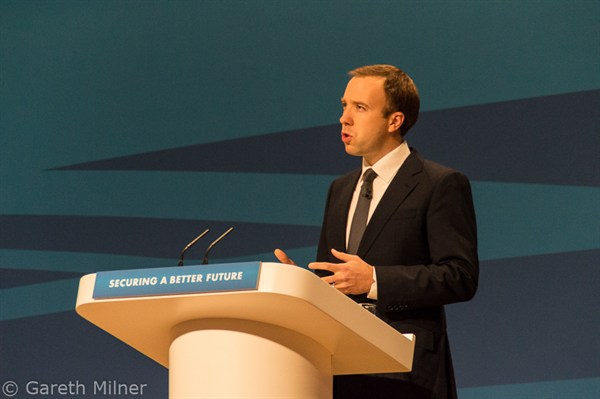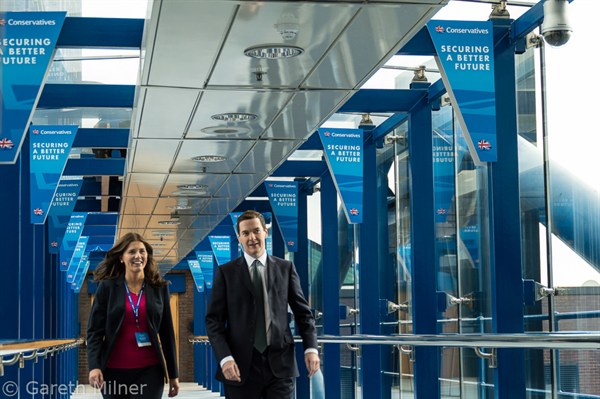Climate change doesn’t appear to be part of the Conservative Party’s electoral strategy. At its annual conference in Birmingham this week it has seemed a case of the less said on the subject, the better.
The Tories’ internal contradictions on climate are no secret. The likes of former environment secretary Owen Paterson have loudly opposed efforts to tackle emissions, while Tory heavyweights like Lord Deben and Michael Howard are firm advocates of action.
These contradictions have left some commentators asking who really speaks for the Conservatives on climate change.
Is it David Cameron who last week called climate change “one of the most serious threats facing our world” and told the conference the UK was leading on climate? Or George Osborne, whose conference speech avoided the subject?
No new climate or energy policy
Walking the halls of Birmingham’s International Convention Centre, the most notable thing about climate at the Conservative conference was the lack of new policy matter on the subject and a general reluctance, from Cameron downwards, to really engage with the issue.
There was no speech from the Department of Energy and Climate Change (DECC) in the conference main hall. Not surprising perhaps, since Liberal Democrat Ed Davey is the secretary of state.
DECC minister Matthew Hancock did speak to the hall but in his other role as minister for business, which appears to be his priority. At energy events on the fringe Hancock was notable mainly by his absence, though he did tell one we need to extract “every last drop” of North sea oil.

Credit: mrgarethm
It was not for want of trying on the part of fringe event organisers. Carbon Brief understands he turned down a speaking slot at an energy event held by right-leaning thinktank Policy Exchange, usually considered a Cameron favourite.
Former Conservative minister and member of Parliament’s energy and climate select committee Peter Lilley spoke at several fringe energy events. This was not so much a case of wanting to push his well-known views on climate, Carbon Brief heard from one organiser, as there being a dearth of prominent Conservatives willing and able to speak on the subject.
Former climate minister Greg Barker is stepping down at the next election along with several other ‘green Conservatives’, for example. Likewise Charles Hendry, another former DECC minister.
Doing the rounds on energy and climate on the conference fringe was left to Hancock’s DECC colleague Amber Rudd, at one point on Monday speaking at two separate but simultaneous events. Fellow DECC minister Baroness Verma was doing the same but has a relatively limited brief at the department.
Both Rudd and Verma managed to sound the right notes without saying anything new. Verma called carbon cuts a “big part” of the energy trilemma, for example, and stubbornly defended existing government policy. That included the Green Deal energy efficiency scheme widely viewed as a failure.
Her efforts at defence were firmly put down by Adam Scorer, director of Consumer Futures, who said that none of the main parties had an energy efficiency policy worth the name.
Elsewhere the conference heard of Conservative support for shale gas, support for new nuclear power and of the need to keep energy costs down. None of this was new.
Relentless narrative
Instead, the relentless narrative being set by chief election strategist Lynton Crosby was front and centre in the halls of Birmingham’s hotels and a convention centre emblazoned with “securing the future” and other mottos. The Conservatives have identified their core messages – above all their “long-term economic plan” – and they are sticking to them.

Credit: mrgarethm
Baroness Verma even managed to shoehorn “long-term plan” into her discussion of the need for a steady energy policy, together with a sideswipe at Labour leader Ed Miliband for his promise to freeze energy prices if he gets elected.
For the Conservatives, the electoral calculus is clear. Take Saturday’s leaked manifesto promise to build 100,000 homes for first-time buyers at a 20 per cent discount. The saving is said to be achievable through exemption from a zero-carbon homes standard and other measures.
Liberal Democrat energy and climate change secretary Ed Davey took to Twitter to oppose the idea as it would mean “higher energy bills for those families”. Yet it seems obvious that cheap new homes now would make for a easier vote winner than the promise of lower bills, for some, in future.
Back at the Tory conference parliamentary candidate Clarence Mitchell, who will challenge for the seat of Green Party MP Caroline Lucas in Brighton Pavillion next May, said it’s a challenge to talk green on the doorstep.
In the weeks and months before May 2015 it’s the problems discussed on those doorsteps that will matter far more to the Conservatives than far-off, intangible problems like climate change.
Even issues like onshore windfarms just aren’t “electorally salient” for the Conservatives says Ben Page, chief executive of pollsters Ipsos MORI.
So to an extent it doesn’t really matter what leading Conservatives think about climate change. Whatever their views on the subject, it probably isn’t a big part of the party’s electoral strategy.

